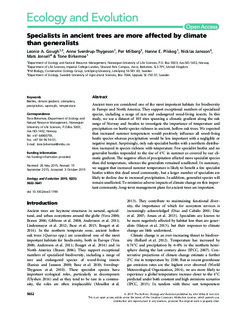| dc.description.abstract | Ancient trees are considered one of the most important habitats for biodiversity in Europe and North America. They support exceptional numbers of specialized
species, including a range of rare and endangered wood-living insects. In this study, we use a dataset of 105 sites spanning a climatic gradient along the oak
range of Norway and Sweden to investigate the importance of temperature and precipitation on beetle species richness in ancient, hollow oak trees. We expected
that increased summer temperature would positively influence all wood-living beetle species whereas precipitation would be less important with a negligible or
negative impact. Surprisingly, only oak-specialist beetles with a northern distribution increased in species richness with temperature. Few specialist beetles and no generalist beetles responded to the rise of 4°C in summer as covered by our climatic gradient. The negative effect of precipitation affected more specialist species than did temperature, whereas the generalists remained unaffected. In summary,
we suggest that increased summer temperature is likely to benefit a few specialist beetles within this dead wood community, but a larger number of specialists are
likely to decline due to increased precipitation. In addition, generalist species will remain unaffected. To minimize adverse impacts of climate change on this important community, long-term management plans for ancient trees are important. | nb_NO |

